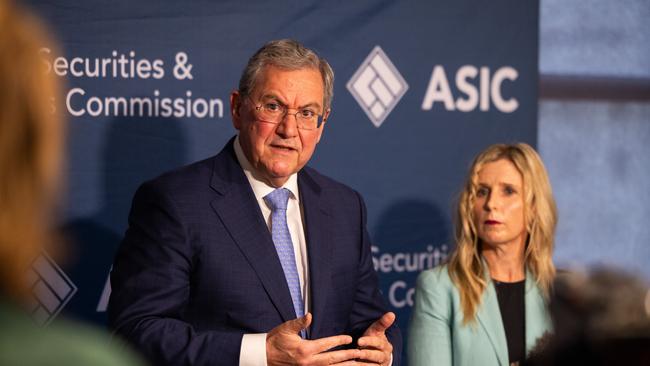Private capital wants better investor protections and to keep some secrets under potential ASIC overhaul
Peak bodies and lenders are largely unified on better protections for retail investors, but at what cost? Some backers say simply asking for more disclosure won’t counter ASIC’s fear of a private credit blow-up.

Business
Don't miss out on the headlines from Business. Followed categories will be added to My News.
Key players in the finance sector have backed a push to reform rules to protect retail investors in private credit markets, but some firms have warned any intervention threatens the market’s success and pushed for a level of regulated secrecy.
Lenders and peak bodies were lining up to make their case to the Australian Securities & Investments Commission on Monday, when deadlines for submissions into a review of the private credit market were due. A string of peak bodies sought more time to respond.
The Association of Superannuation Funds of Australia, which represents the retirement giants, advocated for any new reporting requirements in private credit to made to the Australian Prudential Regulation Authority, which regulates banks and insurers, rather than the public.
ASIC has described the opaque private credit sector as a source of future investor losses, despite not being systemically important to the financial system in its present guise. Chair Joe Longo said the exercise was aimed at enhancing Australia’s capital markets, balancing opportunities and risks.
The Mary Delahunty-led ASFA, which represents industry funds such as AustralianSuper and Cbus, said its submission noted any reform should “prioritise governance and transparency to protect outcomes”.
A spokesman for ASFA said it would call for additional disclosures in the space to be made to APRA, because this would “help safeguard intellectual property and mitigate risks related to nondisclosure agreements”.
“Co-ordination between ASIC and APRA is essential to avoid duplicated efforts, increased compliance costs, and risks to member returns,” the spokesman said.
“Strong public markets remain critical for private market exits like IPOs, while for private markets careful consideration of disclosure is needed to safeguard intellectual property and private market competitiveness.”

ASIC published its landmark report into the rise of private markets in February.
ASFA said its submission noted the diligence and monitoring already in place within the super sector for private markets investments.
The peak body said there was a need to balance retail access to private market products like private equity and private credit against investor protections.
“Increased regulatory scrutiny could make Australia’s private markets less attractive relative to other jurisdictions, potentially limiting global investment opportunities,” ASFA said.
Australian Investment Council boss Navleen Prasad also made the case for regulators “to be as accountable for the opportunity cost of regulation as well as the benefits”.
“Every piece of regulation diverts resources away from productive activity, especially for small and medium businesses,” she said.
The Financial Services Council, representing private credit lenders and super fund interests, said it would make the case for targeted measures to strike the right balance.
FSC policy executive director Chaneg Torres said stronger oversight would strengthen disclosures and governance “without compromising, through undue regulatory burden, the strong returns and growth that have driven the sector’s success,” he said.
The Australian Finance Industry Association, lobbying for the broader financial sector, including several non-bank lenders, was finalising its response to ASIC late on Monday, which would echo industry calls for balanced regulation.
AFIA chief executive Diane Tate rallied against “the temptation to reach for regulation to address volatility and uncertainty via quick-fix solutions”.
“In fact, regulation should be adjusted to make capital allocation easier – for example, by streamlining the regulatory requirements of debt security issuance,” she said.
“It’s all about facilitating the flow of capital to those looking to invest in our economy.”

AFIA sought to clarify the difference between private credit operators and broader non-bank lending.
Ms Tate observed there were a range of non-bank and private credit lenders, and regulators “from time to time just want to put everyone in the same box”.
“In reality, different financial firms do different things – from simple lending in competition with the banks through to investment, market-making, hedging and other important market-based functions,” she said.
Alceon founding partner Trevor Loewensohn said his firm had not made a submission to ASIC’s review but voiced his concern the corporate cop was “looking at a bottom-up regulatory perspective, not a top-down investment universe perspective”.
Mr Loewensohn said ASIC should focus on ensuring “capital is available to the users in the best or most efficiently accessible form to get it”.
“We want to have an efficient capital market with everyone getting access to capital in a semi-equal way,” he said.
“There’s never going to be a way for retail investors to access the same range or degree of sophistication of investments that high-net worths and big investment companies can.”
He concurred with ASFA that there was a risk disclosure changes meant giving away commercially sensitive information.
“That is what you pay a manager for, especially a good one,” he said.
Merricks Capital managing director Geoff Davis said he made the case for ensuring that the role of private credit in providing cash to borrowers where banks had retreated was recognised in the review.
“That capital void is real and it’s going to be filled by lenders willing to work with whatever framework ASIC puts in place,” he said.
“I expect any regulatory framework around private credit to cover off on that, including the governance and investor suitability for those funds, especially for retail-facing funds – that should be a welcome step.”
More Coverage
Originally published as Private capital wants better investor protections and to keep some secrets under potential ASIC overhaul





